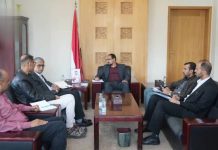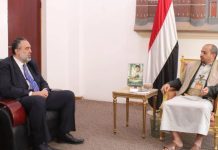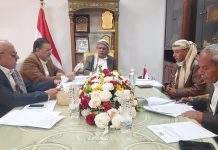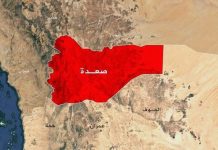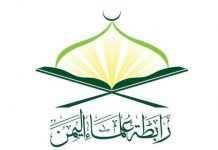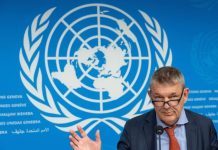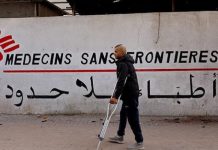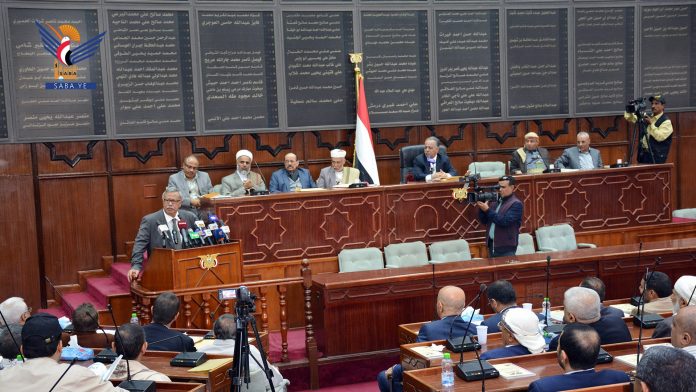The Speaker of the Parliament, Yahya Ali Al-Ra’i, on Sunday stressed the importance of strengthening the national ranks and unifying efforts to confront the conspiracies woven by the Saudi-led aggression coalition, and its implications, and to combat corruption.
This came in his speech at the event organized by the Supreme National Authority for Combating Corruption (SNACC) in the Parliament to review the first annual report and assess the level of implementation of the national anti-corruption strategy, within the framework of implementing the national vision for building the modern Yemeni state 2030.
Al-Ra’i considered the fight against corruption as a battle parallel to the major battle in confronting the aggression and its plans aimed at undermining the homeland and its capabilities.
He called on everyone to stand together alongside the Leader of the Revolution, Sayyed Abdulmalik Badr al-Din al-Houthi, and President of the Supreme Political Council, Mahdi Al-Mashat, and to implement the directives of the Revolution Leader, including those related to combating corruption, applying public order, achieving public tranquility and adhering to laws and regulations.
The Parliament Speaker urged the National Salvation Government to overcome the obstacles and difficulties facing the oversight agencies, including the SNACC, and to provide the necessary funds to enable the authority to perform its work to the fullest.
The stressed the need to unite official and popular efforts to combat and prevent corruption, and to correct imbalances and shortcomings in the various state agencies.
For his part, the Prime Minister, Dr. Abdulaziz Saleh bin Habtoor, He mentioned that the homeland is at an exceptional historical moment during which it is doing a great job in confronting aggression on the borders and internal fronts, and fighting corruption at home.
Dr. bin Habtoor affirmed the failure of the aggression to achieve any of its basic goals in weakening the state and government agencies, foremost of which are the main constitutional institutions of the state.
He explained that everyone cooperated and showed solidarity for a specific basic responsibility, which is to defend the state through the army and security at the borders and internal fronts, and also to ensure that government agencies continue to perform their functions, including the SNACC.
The Prime Minister noted the amount of work that has been achieved over eight years of confronting aggression, siege and fierce war.
He praised the SNACC’s report, and the data it contained as a positive written model, and its vital role in helping everyone to combat corruption.
The Prime Minister reminded the various hostile parties that President Mahdi Al-Mashat runs a country with a large human mass that amounts to 75 percent of the total population, and with limited resources that do not exceed seven percent of what is available to the other party.
“All leaders and employees of all state institutions are required to combat corruption in themselves, their consciences and in their hearts before moving to combat it in functional work, including the issue of building the state,” he said.
In the event, chief of the SNACC – head of the joint coordination unit of the oversight bodies and the Public Prosecution, Judge Mujahid Ahmed Abdullah, spoke about the efforts made to combat and prevent corruption, and to promote the anti-corruption culture.
He stressed that fighting corruption and supporting strengthening independence of oversight and anti-corruption agencies and bodies and the judiciary are the foundation on which financial and administrative reforms of state institutions would be achieved.
Judge Mujahid pointed out the necessity of achieving the six requirements for success in fighting and eliminating corruption and achieving the goals of the national vision for building the modern Yemeni state.
For his part, the Grand Mufti of Yemen, the scholar Shams al-Din Sharaf al-Din, spoke about the importance of fearing Allah Almighty in all actions. He urged everyone to feel responsible in the matter of competence, integrity and piety, and to be keen to work hard for the sake of religion and the nation and to combat and reduce corruption.
The scholar Sharaf al-Din called on the parliament to review and reconsider some laws so that they are fully compatible with Islamic law, and to fill any legal loopholes through which corruption might come through.


